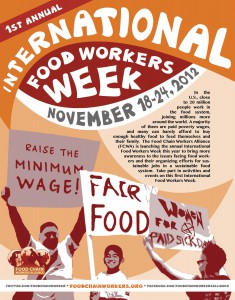Alcohol policy doesn’t get nearly as much attention as it should. Federal estimates are that excessive alcohol consumption costs us $223 billion a year, not to mention the 79,000 deaths nationally. And yet on the rare occasion a political leader tries to even talk about the need to stem the tide of alcohol-related harm, all hell can break loose. This is true especially in New York, where the governor can be found hosting summits pledging to help promote beer and wine produced in the state. No wonder that New York State, at a mere 30 cents per gallon, has one of the lowest rates of wine excise taxes in the nation and at only 14 cents a gallon, one of the lowest on beer.

BLOG
Feds to Parents: Big Food Still Exploiting Your Children, Good Luck with That

If you wanted to ensure a report gets buried, a good time to release it would be the Friday before a holiday week. That the Federal Trade Commission released its latest report on marketing to children then speaks volumes about how seriously the Obama Administration is taking this intractable problem.
Is Big Food Playing Games with Data Reported to Feds on Marketing to Children? A Q&A with ex-industry insider Bruce Bradley
Last week the Federal Trade Commission released its follow-up report on how the food industry markets to children. The media spin is mostly about reduced expenditures, which could be good thing. But is it for real? I asked Bruce Bradley, who worked for fifteen years as a marketer at companies like General Mills, Pillsbury, and Nabisco. He has a different interpretation of what’s going on.
Feds’ Nutritionism Approach to Food Industry “Progress” on Marketing to Children – Q&A with registered dietitian Andy Bellatti
Last week the Federal Trade Commission released its follow-up report on how the food industry markets to children. The agency praised companies for minor improvements in the nutritional profile of some products aimed at children. I asked registered dietitian Andy Bellatti for his take on the FTC’s approach.
Newtown Massacre as a Public Health Failure—and Opportunity

By Nicholas Freudenberg* and Michele Simon
While the nation grapples with how 27 lives were lost in small-town America last Friday, the bigger question is, how are so many lives lost all year around in cities big and small? The public health profession – whose primary aim is prevention – is at least partly to blame for the nation’s failure to address gun violence.
USDA Bowing to Meat Industry Pressure on School Lunch? Guest Post by Amie Hamlin
The recent announcement by USDA that the agency is relaxing (for now) its new limits on meat and grains has garnered mixed reactions from advocates. Some such as Bettina Siegel say the flexibility is needed while others such as Marion Nestle are calling out the politics. I asked Amie Hamlin, executive director of the New York Coalition for Healthy School Food, for her reaction. Hamlin’s group has been pushing for more plant-based options in New York schools for years and knows the issues well. – MS
How Your City Can Push Back Against Fast Food
Last week, the National League of Cities, which represents over 19,000 cities, villages and towns, hosted its annual meeting in Boston, with one of its three aims to “strengthen neighborhoods and families.” What better way to accomplish that goal than to challenge fast food’s influence in their communities? While a couple of conference sessions featured First Lady Michelle Obama’s Let’s Move! program, missing from the agenda was the role fast food plays in communities. That’s why Corporate Accountability International released a report and action guide earlier this year called “Slowing down fast food: A policy guide for healthier kids and families” – to fill this void. Read rest at Corporate Accountability International…
Did You Eat Today? Thank a Food Worker

The most under-reported and neglected aspect of the good food movement is the 20 million workers who toil every day—often under inhumane conditions—harvesting fields, killing and cutting up animals, packing boxes, driving trucks, cooking meals, ringing up orders, serving tables, and cleaning up the mess. Recognizing this reality is the idea behind International Food Workers Week hosted by the Food Chain Workers Alliance, during which numerous actions are being held, including solidarity with the striking Walmart workers planned for Black Friday.
Time to Stop Marketing Food to Kids

I recently gave several talks at the American Public Health Association conference, an annual gathering of some 12,000 enthusiastic public health professionals. In years past, not many presentations (other than my own) focused on the role of corporations to harm the public’s health. I am happy to report this is changing, as numerous panels struck such a theme. The following is a summary of my talk on the recent failed attempt by the federal government to rein in junk food marketing to children, and why it’s time to set a new and much bolder course to fix this problem.














